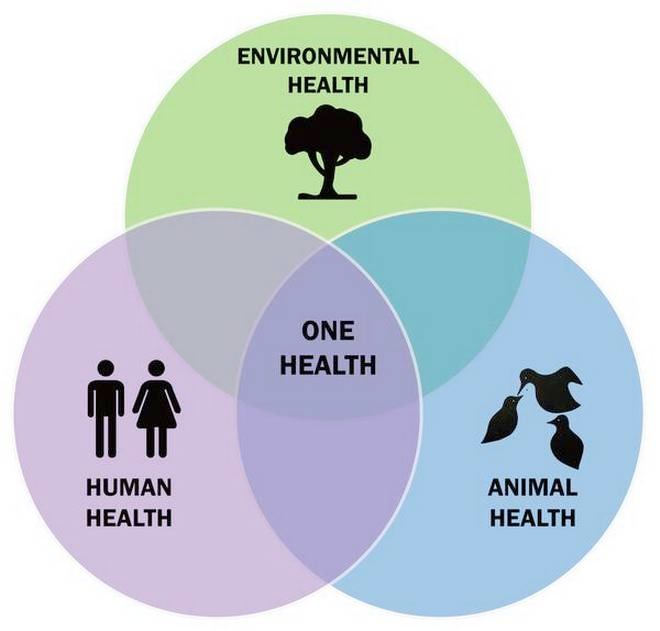Governance
One Health
- 07 Apr 2022
- 5 min read
For Prelims: One Health, National Digital Livestock Mission.
For MAins: One health Concept and its significance. India’s One Health Framework.
Why in News?
The Ministry of Fisheries, Animal Husbandry and Dairying has launched a pilot project in the state of Uttarakhand to implement the One Health Framework by One Health Support Unit.
- The key objective of the Unit is to develop a national One Health roadmap based on the learnings of the pilot project implementation.
- Some of the key activities to be undertaken as part of the pilot project include institutionalizing the mechanism for data collection on disease outbreaks, prevalence, management, and development of targeted surveillance plan, integrating network of laboratories, developing and implementing communication strategy across sectors and integration of the data with the digital architecture of the National Digital Livestock Mission.
What is the One Health Concept?
- About:
- One Health is an approach that recognizes that the health of people is closely connected to the health of animals and our shared environment.
- One Health’ vision derives its blueprint from the agreement between the tripartite-plus alliance comprising the Food and Agriculture Organization of the United Nations (FAO), the World Organisation for Animal Health (OIE).
- It’s purpose is to encourage collaborations in research and sharing of knowledge at multiple levels across various disciplines like human health, animal health, plants, soil, environmental and ecosystem health in ways that improve, protect and defend the health of all species.
- Increasing Significance: It has become more important in recent years because many factors have changed interactions between people, animals, plants, and our environment.
- Human Expansion: Human populations are growing and expanding into new geographic areas due to which close contact with animals and their environments provides more opportunities for diseases to pass between animals and people.
- Of the contagious diseases affecting humans, more than 65% are of zoonotic or animal to man origin.
- Environmental Disruptions: Disruptions in environmental conditions and habitats can provide new opportunities for diseases to pass to animals.
- International Travel & Trade: The movement of people, animals, and animal products has increased from international travel and trade due to which diseases can spread quickly across borders and around the globe.
- Viruses in Wildlife: Scientists have observed that there are more than 1.7 million viruses circulating in wildlife, and many of them are likely to be zoonotic.
- This implies that unless there is timely detection, India risks facing many more pandemics in times to come.
- Human Expansion: Human populations are growing and expanding into new geographic areas due to which close contact with animals and their environments provides more opportunities for diseases to pass between animals and people.
What is India’s One Health Framework?
- In keeping with the long-term objectives, India established a National Standing Committee on Zoonoses as far back as the 1980s.
- Further, the Department of Animal Husbandry and Dairying (DAHD) has launched several schemes to mitigate the prevalence of animal diseases.
- In addition, DAHD will soon establish a ‘One Health’ unit within the Ministry.
- Additionally, the government is working to revamp programmes that focus on capacity building for veterinarians and upgrading the animal health diagnostic system such as Assistance to States for Control of Animal Diseases (ASCAD).
- Recently, funds were sanctioned for setting up a ‘Centre for One Health’ at Nagpur.
- Also, the Department of Biotechnology has launched the country’s first One Health consortium.
Way Forward
- The Covid-19 pandemic showed the relevance of 'One Health' principles in the governance of infectious diseases, especially efforts to prevent and contain zoonotic diseases throughout the world.
- India needs to scale up such a model across the country and to establish meaningful research collaborations across the world.
- There is a need to develop best-practice guidelines for informal market and slaughterhouse operation (e.g., inspections, disease prevalence assessments), and creating mechanisms to operationalise ‘One Health’ at every stage down to the village level.
- Awareness generation, and increased investments toward meeting ‘One Health’ targets is the need of the hour.





